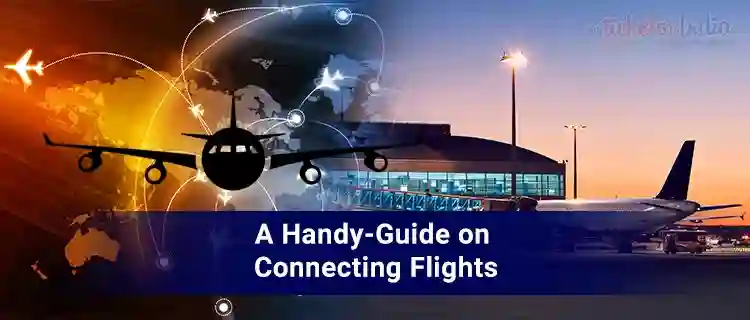Flight Connections – What Are They and How to Handle Them

Last Updated on May 8th, 2025 by Heena Ganotra, Leave a Comment
Sometimes travellers can’t find a direct route to their destination and need to catch flight connections. This can be an intimidating and stressful experience for many, especially if they’re travelling internationally and are boarding a connecting flight for the first time. Fortunately, this process is fairly streamlined and can go smoothly if you have the right information on hand. Let’s look at some details that will help you get on a connecting flight smoothly.
What Does Connecting Flight Mean?
A connecting flight is a one-stop trip that involves one of two options –
- You disembark and board on a different flight of the same or different airline.
- You remain seated until some passengers disembark and wait for the flight to take off again.
While most passengers prefer a direct flight, connecting flights are very common. They ensure that one can travel from almost any region to any destination, no matter how far.
For example: many flights between Australia and India stop at the Changi Airport in Singapore before moving forward with the journey.
Most flight connections happen because the destination you want to reach isn’t near a major airport. That means you need to fly to a major airport first and then catch a flight connect to the smaller regional airport.
What Should You Expect from a Connecting Flight?
It is important to understand what happens during a connecting flight to have a smooth journey. If you know what to expect, you won’t be stressed out or nervous during the trip. Here’s a look at what you should know:
- In most cases, internal transfers are quick and hassle-free. You just need to disembark, go through the transfer area, and check into your next flight.
- You don’t need to pick up the baggage with connecting flights as the airline will transfer your luggage directly.
- If you’re on an international flight, you will need to go through security check-in once again before boarding your connecting flight.
- If your next flight is in a different terminal or from a different airline, you will need to go through the security and baggage check-in process once again.
In most cases, the connecting flights are parked next to each other so your boarding gates shouldn’t be too far apart. We still recommend checking the airport layout and related information carefully to determine how much time it would take for you to get from one flight to another. Always make sure you have enough time for a security check between transfers.
Connecting Flight Baggage Transfer – Same Airlines
If the connecting flight is of the same airline, the baggage transfer process is very simple and straightforward. All your bags are directly sent to the new flight and there’s no need to manually claim baggage and then check them into the next flight.
Connecting Flight Baggage Transfer – Different Airlines
The case of baggage transfer between different airlines is a bit more complicated. The details depend on how you have booked a ticket and what kind of agreement the two airlines have. Here’s a look at a few different scenarios to help you understand:
1. Same Ticket
If you have booked a ticket for the entire trip and it involves two different airlines, the trip will usually involve direct baggage transfer. In this case, the flight and the connection have been prearranged as an agreement between two airlines. You just need to disembark, go through security, and transfer without worrying about your baggage.
2. Different Tickets
If you’re planning on booking connecting flights separately, you need to prepare for a manual transfer. If you have two different tickets for two different airlines, leave enough room between the flight connections to claim your baggage from the first flight, transfer to a different gate, check baggage again, go through security, and then board the connecting flight. Direct transfers are usually not available in these cases.
3. Interline Agreement
If the airline of your first flight has an interline or codeshare agreement with the airline of your connecting flight, you may not need to transfer your baggage directly. The agreement usually involves a smooth transfer of luggage between two airlines. Just check to see if the airlines you use are in an interline agreement before you book a ticket. You can also consult with your travel agent on the matter to understand the details.
4. Going Through Customs
If you’re on an international trip and need to go through customs check before boarding a connecting flight, you will need to collect your luggage and go through the check-in process again. This is done to ensure the journey is safe for everyone and passengers aren’t carrying any illegal materials with them.
As you can see, the situation with connecting flight baggage is somewhat complicated if you’re boarding a different airline. It is best to confirm the details before you book to ensure you have enough room to carry out the transfer smoothly.
Complications During the Connecting Flight Trip
People prefer a direct flight because it is hassle-free and low-risk. With connecting flights, there is a small chance that something will go wrong during the journey. Here’s a look at some of the most common issues that pop up so you know how to handle them:
1. Connecting Flight Delay
If your first flight is delayed, you may feel stressed out about your connecting flight. If the connecting flight is of the same airline, it is likely to wait a little longer to accommodate for the delay. If you miss your connecting flight because of the delay, your airline will probably make alternative arrangements for you.
If the flight is from a different airline, you may need to make alternative arrangements yourself, though most airlines will offer assistance on the matter.
2. Missing A Connecting Flight
If you have missed your connecting flight and the baggage transfer between the flights is automatic, your luggage is already on its way to your destination. If you have missed your flight because of delays by your first flight, your luggage may not have been transferred. You can confirm the situation with your airline before making a decision.
If you face an issue during your connecting flight, contact your airline’s staff and look for a solution. You can also contact your travel agent directly for some assistance as well.
Tips for Boarding Flight Connections Smoothly
Boarding a connecting flight doesn’t have to be a stressful affair. We recommend following the tips mentioned below for the best experience:
- Know what the minimum connection time for your airline and airport is. Calculate how long it will take for you to transfer from one flight to another.
- Travel on one ticket as much as possible. Don’t book different tickets for connecting flights unless absolutely necessary.
- Pick a single airline or an airline with an interline or codeshare agreement with your first airline.
- Always leave room for delays and unexpected issues. Don’t leave connections to the last minute.
- Pick a hub that will help you get smooth transfers. Some airports are more transfer-friendly than others.
If you follow these tips, it will be easier to catch flight connections and go through the journey smoothly. Speak with our travel agent if you want to know more or need some assistance.
Frequently Asked Questions
Q. What is an internal connection flight?
A: An internal connecting flight involves flight of the same airlines or between airlines that are in an interline agreement. This ensures the baggage transfer is carried out smoothly between the two flights.
Q. Can you book connecting flights separately?
A: Yes, you can. These are called self-connecting flights and they can prove to be more affordable or convenient for some passengers. However, if the connection isn’t organized by the airline, you will need to go through the entire security, baggage check-in, and transfer process yourself. There is also a risk involved if your first flight is delayed or cancelled.
Q. What happens if you miss a connecting flight?
A: If you miss a connecting flight, you need to rebook an alternative flight. If you happen to miss it because of flight delays or cancellations, the airline may help you arrange for a new flight to your destination, especially if the connecting flight was also from the same airline. Just speak with the executive at the airline’s check-in counter for assistance.
Q. What is the minimum connection time Sydney domestic to international?
A: The minimum connection time is the time you need to transfer from one flight to another in a specific airport. The time varies depending on the airport and their set-up. The minimum time at Sydney is around 90 minutes.
Q. Do I need a visa for a connecting flight?
A: No, in most cases, travelers don’t need a visa for their layover country when they’re on a connecting flight. For example, you don’t need a Singapore visa if you’re laying over at the Changi airport on the way to New Delhi. However, there may be exceptions so you need to confirm the details before your trip.
There! That’s everything you need to know about flight connections!
Now, all you have to do is book your tickets and get started on your journey. MyTicketsToIndia can help with this process. Our team of experts will find the best flight deals and discounts on Australia to India flights (and back) for you so you can save money on your trip. After all, the more money you save, the more you can spend on food and gifts! Just request a callback or call on our number 1800 860 816 to know more!
About Heena | View Posts
A writer by both passion and profession, Heena Ganotra is "half agony, half hope" but all heart. And oh, she has been a book lover from the start! Her love for books is what convinced her to make a career in the wonderful world of words. She loves what she does and is out-and-out a satisfied soul with a wish to spread happiness and kindness in abundance. Insight- Some say she is living the best life anyone could because she reads, writes, travels, and makes merry. They’re right because what else does one really need! :)
Latest Blog
-
Sleepless on a Plane? Not Anymore - Here’s How to Catch Real Zzz’s!!
Updated on 16 Sep 2025 -
Is It Safe to Fly with Air India From Australia To India?
Updated on 27 Aug 2025 -
Guide to Booking Multi-City Flights in Advance – Tips, Process & Group Travel Information!
Updated on 20 Aug 2025 -
Qantas Direct Flights Routes from Australia to India
Updated on 28 Apr 2025 -
Air India Direct Flights Routes from Australia to India
Updated on 28 Apr 2025

Discuss this post ?